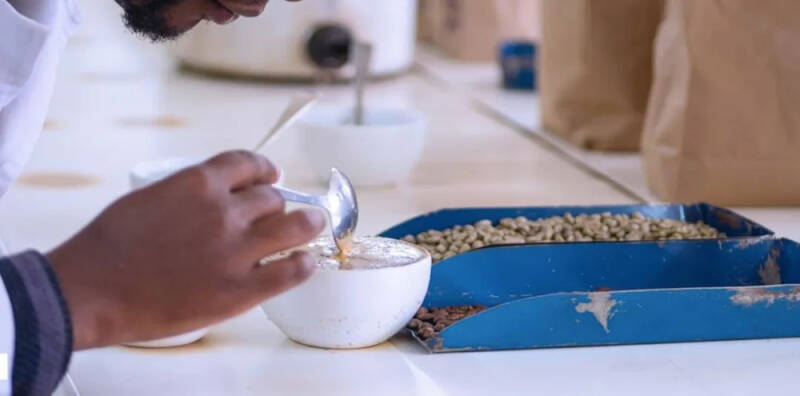What do "AA" and "Top" of Kenyan coffee beans mean?
Kenyan coffee has always been famous around the world for its distinctive and complex raspberry sour aroma, sugarcane sweetness and juicy acidity, and is loved by coffee lovers all over the world. However, when you buy Kenyan coffee beans, you will find that most of the coffee produced and exported in Kenya will appear words such as "AA". For example, Asalia AA TOP of Kenya, which is currently on the front street, what do the words "AA" and "TOP" mean behind the beans?

First of all, the "AA" behind the coffee bean refers to the grade of the coffee bean. In fact, coffee beans belong to agricultural products, so the quality of products will be good and bad, so each coffee producing country will develop its own classification according to different national conditions. The aim is to produce homogeneous commercial batches that meet established quality standards, thereby promoting a fair pricing system.
The Kenyan government established an auction system in 1934 to ensure that the quality of coffee is closely linked to the price. Every year, thousands of Kenyan small farmers collect their coffee beans through coffee cooperatives and send them to the central auction house in Nairobi, the capital. These coffee beans undergo a strict grading before the auction.
The same grading system will be used for both self-sale and takeout. According to the size, shape, color and density of coffee beans for rating, generally take the size and quality of coffee beans as indicators, there are clear provisions, divided into AA, AB, PB, C, E, TT, T, strict classification can ensure the quality of coffee beans.
The number of AA coffee beans is between 17 and 18 mesh, with good density, is the highest quality recognized locally, and has elegant taste and flavor. The number of AB coffee beans is between 16 and 17 mesh, although the quality is not as high as AA, but the price is more favorable and is also very popular, while the output is the highest, about 40% of Kenyan coffee is AB. PB refers to round raw beans. There is only one round bean in the coffee fruit, rather than the usual two flat beans. Only 5% of Kenyan coffee has such round beans, classified by shape and has nothing to do with flavor weight. The number of C-grade coffee beans is between 12 and 14 mesh, and the size is relatively small. Beans of this grade are basically not included in the boutique level.
The full name of E-grade coffee bean is Elephant, also known as elephant bean, which is similar to round bean and is a special coffee bean with abnormal development. This kind of bean is twisted by two coffee beans in the process of development, forming what looks like a very large coffee bean, with an order of more than 21 mesh, which is very rare. TT coffee beans are light beans that are sorted from E, AA and AB beans by airflow filters, so beans will have 16-20 mesh. T-grade coffee beans are broken, defective, and too small coffee beans classified from C-grade beans, usually under 12 orders. MH/ML grade coffee beans refer to lower-quality coffee beans, which mainly use sun treatment, and are only sold domestically, not exported. Therefore, in the Kenyan rating, "AA" represents the highest level in the region. But in fact, the size of coffee beans can not directly affect the taste of coffee, the planting environment is the main flavor effect of coffee beans in the growth process. Therefore, the local coffee research institutions and the coffee raw bean trade association use a set of coffee grading methods developed by themselves to conduct a second rating of exported coffee.

The system, known as the Coffee Bean quality grading Program (Kenyan Classification Procedure by Quality Assessment), was developed by the Kenya Coffee Research Institute. "TOP", "Plus (+)" and "FAQ" are the marks of the secondary rating, which are usually marked after the original grade and are generally classified according to the cup test score.
The TOP level is that the cup test score of coffee beans is above 86, Plus (+) is that the cup test score is between 84 and 86, and FAQ is that the cup test score is about 83-84. However, the system is not officially certified in Kenya, so most of the Kenyan beans currently available on the market are still graded in a conventional size.
For more information about coffee producing areas, please scan the code directly and follow: coffee comments.
Long press the QR code to follow:
TRANSLATE with
XEnglishArabicHebrewPolishBulgarianHindiPortugueseCatalanHmong DawRomanianChinese SimplifiedHungarianRussianChinese TraditionalIndonesianSlovakCzechItalianSlovenianDanishJapaneseSpanishDutchKlingonSwedishEnglishKoreanThaiEstonianLatvianTurkishFinnishLithuanianUkrainianFrenchMalayUrduGermanMalteseVietnameseGreekNorwegianWelshHaitian CreolePersian
TRANSLATE with
COPY THE URL BELOW
BackEMBED THE SNIPPET BELOW IN YOUR SITE Bing Webmaster PortalBack
Important Notice :
前街咖啡 FrontStreet Coffee has moved to new addredd:
FrontStreet Coffee Address: 315,Donghua East Road,GuangZhou
Tel:020 38364473
- Prev

The cumulative loss is 1.65 billion yuan! Severe weather in Brazil has serious impact
According to Brazilian media reports, the state of São Paulo was hit by a strong storm accompanied by record strong winds, killing at least seven people and losing power to 2.1 million residents and commercial users. Currently, according to reports from São Paulo National Electric Power Company (Enel SP), power supply has been restored to most areas affected by the storm.
- Next

What is Breve Coffee? What is the ratio of concentrate to milk in latte? What is the difference between Brevet and half latte?
Latte, which I believe you are already familiar with, is a coffee made by adding a large amount of milk to the concentrate. Because the existence of a large amount of milk balances out the bitterness, latte will have a higher acceptance than other traditional coffees: mellow and fragrant, high sweetness but not bitter
Related
- What grade does Jamaica Blue Mountain No. 1 coffee belong to and how to drink it better? What is the highest grade of Blue Mountain coffee for coffee aristocrats?
- What are the flavor characteristics of the world-famous coffee Blue Mountain No. 1 Golden Mantelin? What are the characteristics of deep-roasted bitter coffee?
- Can I make coffee a second time in an Italian hand-brewed mocha pot? Why can't coffee be brewed several times like tea leaves?
- Hand-brewed coffee flows with a knife and a tornado. How to brew it? What is the proportion of grinding water and water temperature divided into?
- What is the difference between Indonesian Sumatra Mantinin coffee and gold Mantinin? How to distinguish between real and fake golden Mantelin coffee?
- What does bypass mean in coffee? Why can hand-brewed coffee and water make it better?
- Unexpected! Ruixing Telunsu lattes use a smoothie machine to foam milk?!
- % Arabia's first store in Henan opens into the village?! Netizen: Thought it was P's
- Does an authentic standard mocha coffee recipe use chocolate sauce or powder? Mocha Latte/Dirty Coffee/Salty Mocha Coffee Recipe Share!
- What is the difference between Vietnam egg coffee and Norway egg coffee? Hand-brewed single product coffee filter paper filter cloth filter flat solution!

